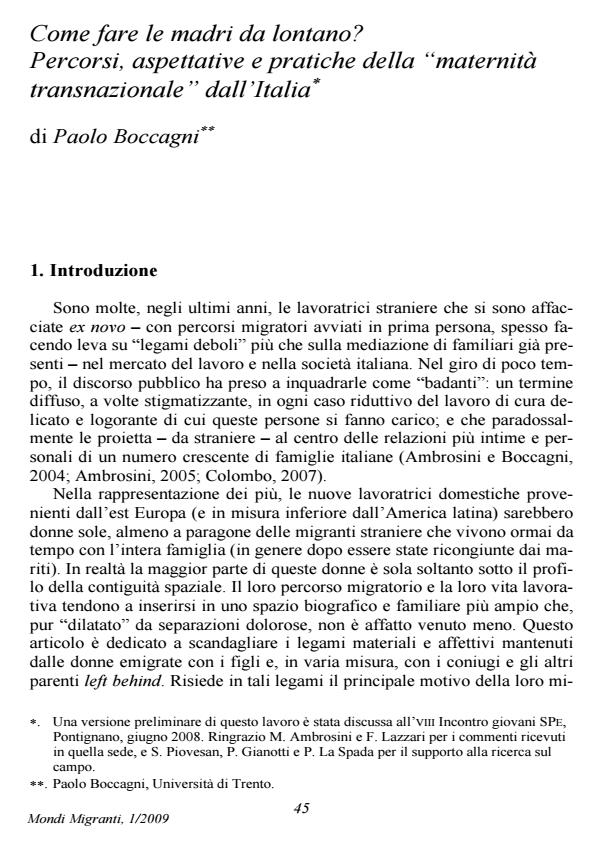Come fare le madri da lontano? Percorsi, aspettative e pratiche della "maternità transnazionale" dall’Italia
Journal title MONDI MIGRANTI
Author/s Paolo Boccagni
Publishing Year 2009 Issue 2009/1
Language Italian Pages 22 P. 45-66 File size 201 KB
DOI 10.3280/MM2009-001003
DOI is like a bar code for intellectual property: to have more infomation
click here
Below, you can see the article first page
If you want to buy this article in PDF format, you can do it, following the instructions to buy download credits

FrancoAngeli is member of Publishers International Linking Association, Inc (PILA), a not-for-profit association which run the CrossRef service enabling links to and from online scholarly content.
How can mothering be practised at a distance? On the life trajectories, per-sonal expectations and practices underlying transnational motherhood in Italy - Abstract Transnational caregiving, i.e. the ongoing affectional and material care relationships between migrant parents and children left behind, has gained increas-ing salience in international literature. The paper builds on the results of one of the first empirical investigations on the topic in Italy. The biographical experience of transnational mothers is approached within a local immigration context (the prov-ince of Trento). Relevant insights are thus provided on four areas of concern: the origin and the development of migration processes; the relationships with the motherland and the forms of transnational caregiving; the relationships with local communities, and the networks migrants rely on, in the context of settlement; the personal experiences of transnational motherhood and the future life expectations. Besides making sense of the differences in transnational parenthood stemming from national origins, and from the structuration of migration systems, the paper copes with a key question: to what extent, and under which conditions, can rela-tionships of "proximity at distance" be fungible with those drawing on physical proximity? What is lost and what is retained in the bond between dear ones - in terms of exchanging information, affections and material resources - once it cannot rely on physical co-presence?
Keywords Female migration - Migrant mothers - Transnational caregiving - Transnational family life - Care work.
- Migrazioni femminili e traiettorie di incorporazione: tra continuità e mutamento nei contratti di genere Paola Bonizzoni, in MONDI MIGRANTI 3/2014 pp.95
DOI: 10.3280/MM2013-003005 - Familles salvadoriennes à l'épreuve de la distance : solidarités familiales et soins intergénérationnels Laura Merla, in Autrepart /2011 pp.145
DOI: 10.3917/autr.057.0145 - Parenting from a distance and processes of family reunification: A research on the Italian case Maurizio Ambrosini, in Ethnicities /2015 pp.440
DOI: 10.1177/1468796814547059 - La gestion des émotions dans le cadre du devoir filial Laura Merla, in Recherches sociologiques et anthropologiques /2010 pp.39
DOI: 10.4000/rsa.186 - Irregular but tolerated: Unauthorized immigration, elderly care recipients, and invisible welfare Maurizio Ambrosini, in Migration Studies /2015 pp.199
DOI: 10.1093/migration/mnu042
Paolo Boccagni, Come fare le madri da lontano? Percorsi, aspettative e pratiche della "maternità transnazionale" dall’Italia in "MONDI MIGRANTI" 1/2009, pp 45-66, DOI: 10.3280/MM2009-001003